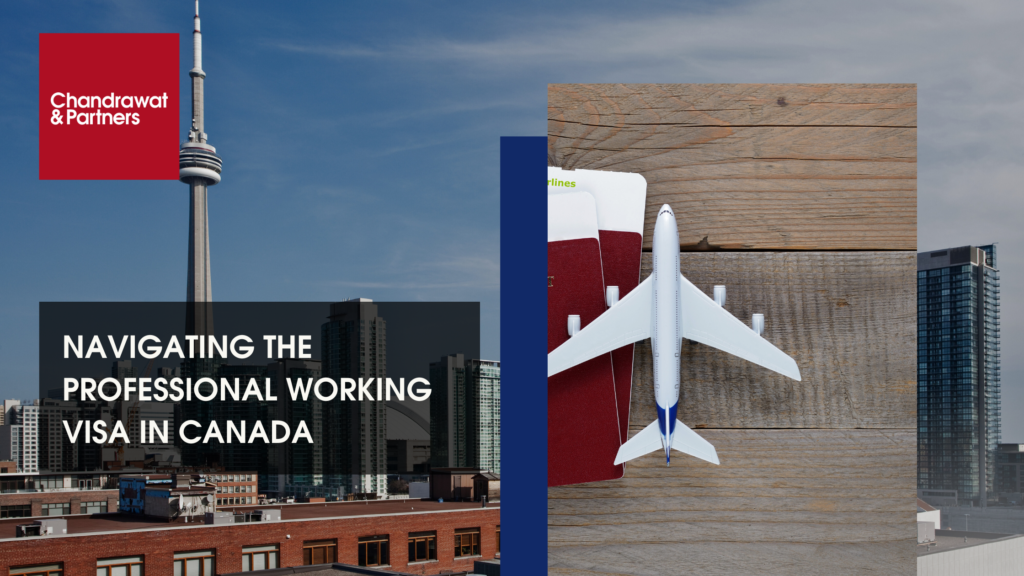
September 25, 2024
NAVIGATING THE PROFESSIONAL WORKING VISA IN CANADA
INTRODUCTION
Applying for a professional working visa in Canada involves obtaining a work permit and, in some cases, a Long-Stay Visa. Canada is an attractive destination for specialists worldwide, thanks to its strong economy, diverse job opportunities, and high quality of life. Securing the right visa is essential for a successful stay and employment in the country, allowing you to enjoy all the benefits Canada offers.
THE CANADIAN BUSINESS ADVANTAGE
Canada is an attractive destination for professionals seeking new opportunities due to its strong knowledge economy and welcoming environment. With thriving industries like technology, healthcare, and finance, the country offers diverse job prospects supported by government initiatives. Canada’s multicultural society embraces immigrants, facilitating their integration into the workforce. The high standard of living, excellent healthcare, and quality education enhance daily life.
Additionally, Canadians value work-life balance, with many employers providing flexible arrangements. Overall, Canada’s economic opportunities, inclusivity, and focus on well-being make it an ideal choice for professionals aiming to advance their careers.
ELIGIBILITY REQUIREMENTS FOR THE APPLICANTS
- Foreign Workers with Job Offers: Most foreign nationals must have a job offer from a Canadian employer to be eligible for a work permit.
- International Students: Graduates from designated Canadian institutions can apply for a Post-Graduation Work Permit (PGWP) to work in Canada.
- Spouses of Workers or Students: Spouses or common-law partners of international students or temporary foreign workers can apply for an open work permit.
- Certain Professionals: Individuals eligible under specific agreements, such as the United States-Mexico-Canada Agreement (USMCA), can work in Canada without a job offer.
- Individuals with LMIA Exemptions: Some applicants may qualify for work permits without needing a Labour Market Impact Assessment (“LMIA”), depending on the type of job or program.
- Permanent Residents and Citizens: Canadian citizens and permanent residents can work freely in Canada without restrictions.
- Temporary Residents: Some temporary residents, such as individuals on a Bridging Open Work Permit (BOWP), may also be eligible to work while awaiting permanent residency decisions.
TYPES OF WORK VISAS IN CANADA
- Temporary Foreign Worker Program (TFWP): Allows Canadian employers to hire foreign workers temporarily, typically requiring a Labour Market Impact Assessment (LMIA).
- International Mobility Program (IMP): Facilitates the hiring of foreign workers without an LMIA for certain categories, promoting faster entry into the Canadian workforce.
- Post-Graduation Work Permit (PGWP): Designed for international students who have graduated from eligible Canadian institutions, allowing them to work in Canada for a duration that matches their study program.
- Open Work Permit: Grants individuals the flexibility to work for any employer in Canada without needing a specific job offer or LMIA.
- Employer-Specific Work Permit: Tied to a particular job and employer, this permit outlines specific conditions and limitations for employment.
- Global Talent Stream (GTS): Part of the TFWP, this stream expedites the hiring of highly skilled workers in in-demand occupations.
- Self-Employed Persons Program: Enables individuals to establish their businesses or work as self-employed individuals in Canada, contributing to the economy.
UNDERSTANDING CANADA WORK PERMITS
Canada offers two main types of work permits for foreign workers, both permits offer opportunities to gain valuable work experience in Canada under different conditions. They are-
- Employer-Specific Work Permit: This type of permit is issued when a foreign worker has a job offer from a specific Canadian employer. The worker is bound to that employer, meaning they can only work for the company stated on the permit. It outlines the employer’s name, job location, and the duration of employment. To obtain this permit, the employer often needs to secure a Labour Market Impact Assessment (LMIA), proving that no Canadian citizen or permanent resident can fill the role.
- Open Work Permit: In contrast, an open work permit provides greater flexibility, allowing individuals to work for any employer in Canada, without needing a job offer beforehand or an LMIA. This permit is ideal for certain groups, such as international students’ spouses or individuals awaiting permanent residency decisions. However, it excludes working for employers who are non-compliant with labor regulations or listed as ineligible.
DOCUMENTS REQUIRED
- Completed Application Form: Either online or paper application form.
- Valid Passport: Ensure your passport remains valid for the duration of your intended stay.
- Job Offer Letter: For employer-specific permits, an official job offer from a Canadian employer is needed.
- Labour Market Impact Assessment (LMIA): Required for most employer-specific permits unless exempt.
- Proof of Funds: Evidence that you can financially support yourself during your stay in Canada.
- Medical Exam: Required if you’re planning to work in jobs related to healthcare, or for long stays.
- Police Clearance Certificate: Proof of a clean criminal record.
- Biometrics: Fingerprints and photos may be required.
- Proof of Relationship: For open work permits for spouses or dependents, relevant relationship documents.
- Other Supporting Documents: Educational certificates, work experience letters, etc., (if applicable).
ANALYSIS
Applying for a professional working visa in Canada requires an understanding of work permit types and eligibility. Applicants must submit a completed application, proof of job offers, and, if applicable, a Labour Market Impact Assessment (LMIA) to enhance their chances of approval.
HOW WE MAY HELP?
- Our team is here to offer consultations that clarify the visa requirements, eligibility criteria, and the complete application process for working in Canada.
- We assist in preparing and reviewing all essential documents for your visa application, ensuring everything is accurate and complete.
- Additionally, we support employers in Canada with sponsorship responsibilities, document submissions, and work permit applications.
- We also provide guidance on visa renewals, work permit extensions, and residency applications, ensuring adherence to Canadian immigration regulations.
For more information or queries, please email us at
enquiries@chandrawatpartners.com
Key Contact

Surendra Singh Chandrawat
Managing Partner

